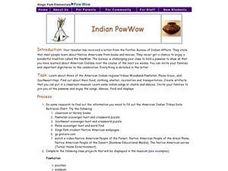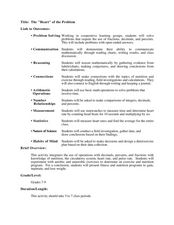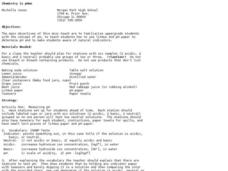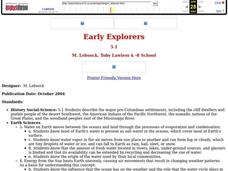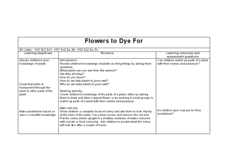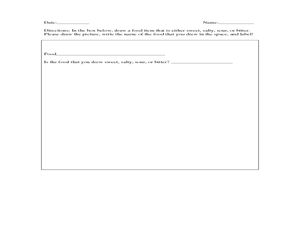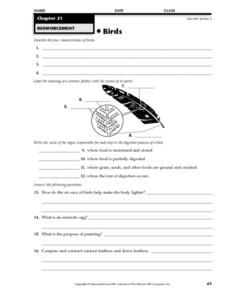Curated OER
Predator vs. Prey
Fifth graders participate in a game to become familiar with predators and preys. For this predator vs. prey lesson, 5th graders ascertain whether a photo shows an organism as a predator or a prey. Students read Killer Creatures....
Curated OER
Ecology of the Savanna-Forest Boundaries in Central Brazil
Students explore photosynthesis. In this photosynthesis lesson, students label parts of photosynthesis and take notes. Students conduct experiments on leaves, make observations and record their findings.
Curated OER
Social Studies:
Young scholars identify various types of breads fromother countries and locate them on maps. In small groups, they make story maps of books that mention bread and make books resembling sandwiches. Students have a bread tasting party...
Curated OER
Indian PowWow
Students identify three different American Indian regions and tribes, their food, clothing, shelter, recreation, and transportation. Students create artifacts that can be placed in a museum. Students sing songs, chants, and dance. ...
Curated OER
The Sponges
In this sponge worksheet, students read about the different parts of a sponge and answer 20 short answer questions that follow. They color and label different sponge drawing.
Curated OER
RNA Worksheet
In this RNA worksheet, students determine the function of mRNA and tRNA and create an mRNA strand from a given DNA strand. Students describe and compare the 3 types of RNA. This worksheet has 1 drawing, 2 fill in the blank, and 14 short...
Curated OER
How Plants Spice Up Our Lives
Third graders study plants. In this biology lesson plan, 3rd graders label and identify parts of plants, identify spices obtained from plants, and determine what part of a plant a spice comes from by using taste, touch, smell and sight.
Curated OER
What Does The Heart Do?
Students study the relationship between the heart and circulation. In this circulatory system lesson, students read the "What Am I?" article about the heart and discuss. Students draw a heart and lungs, discover how blood is pumped...
Curated OER
The "Heart" of the Problem
Students create an exercise and nutrition program. In this interdisciplinary lesson, students use calculations of exercises plus their corresponding effects on the body and nutritional values of food to derive a health plan. Students...
Curated OER
Funky Fungus
Students discuss decomposition, bacteria, fungi and other microscopic organisms. They participate in an experiment to grow fungus on bread. As the fungus colonies grow, students observe them under a microscope to identify and locate...
Curated OER
Put a Rainbow on Your Plate
In this nutrition worksheet, students investigate the importance of eating fruits and vegetables of different colors 5 times a day. Students complete 8 pages of activities such as menu planning, shopping lists, word search, word...
Curated OER
Chemistry is pHun
Students investigate the pH of solutions and they learn how to use different types of indicators. In this pH lesson plan, students test various solutions with pH paper and determine if they are acidic, basic or neutral. They also test...
Curated OER
Early Explorers
Fifth graders study early explorers. In this World history lesson plan, 5th graders draw an outline of a map labeling each part, build geographical features out of dough, and paint each of the land and water features.
Curated OER
Squid Dissection
First graders participate in dissecting a squid. They identify and locate specific parts of a squid with teacher guidance. They draw a picture of what their squid looked like and label specific parts.
Curated OER
Earth's Heavenly Treasures: Hummingbirds
Young ornithologists watch an informative video and use the Internet to gather data about the life, size, habitat, and migration of hummingbirds. The interdisciplinary lesson includes activities that target art, science, math, and...
Curated OER
St. Patrick's Day Snack
First graders design a green snack menu from all four food groups for St. Patrick's Day.
Curated OER
Flowers to Dye For
Learners observe biology by completing a plant experiment in class. In this botany instructional activity, students discuss the anatomy related to a plant and how roots and stems are necessary to its survival. Learners utilize food...
Curated OER
Terrific Taste Buds
Learners explore descriptive writing by eating food in class. In this descriptive word lesson, students assess different foods in class such as jelly beans and utilize their vocabulary to describe the taste. Learners read the story...
Curated OER
Cell City
Students understand how various cell parts function and how they are related to the genetic process by creating a model and symbol to depict the function of the cell parts. They research a cell part to determine function and then cut...
Curated OER
Texas Estuary Project
Students take a field trip to a local estuary and analyze water samples. They analyze and graph the data results, write an essay, and create a food web of their field site.
Curated OER
A Helthy Diet
Students examine their eating habits and experience analyzing data and drawing conclusions. They construct models of the molecular backbone of saturated and unsaturated fats. In addition, they examine the labels of their food, record...
Curated OER
Bird Activity
For this bird worksheet, students complete a set of 16 activities about birds, listing characteristics, matching organs with steps in the digestive process, labeling a drawing of a feather and completing 4 short answer questions.
Curated OER
Showing Nature's Way-Plant Development and the Plant Parts We Eat
Students explore plant life. For this science lesson plan, students demonstrate and record the stages of plant growth and categorize food plants by identifying the edible part.
Curated OER
Comparing Seeds
Students explore the process of growing plants from seeds. In this hands-on science experiment, students observe different seeds (store bought vs. those directly from food items) and predict growing patterns.



